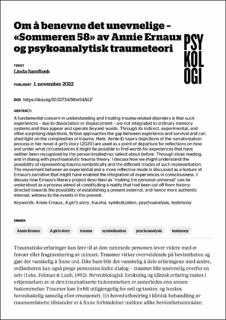Om å benevne det unevnelige – «Sommeren 58» av Annie Ernaux og psykoanalytisk traumeteori
Peer reviewed, Journal article
Published version
Permanent lenke
https://hdl.handle.net/11250/3048766Utgivelsesdato
2022-11-01Metadata
Vis full innførselSamlinger
Originalversjon
Tidsskrift for Norsk Psykologforening. 2022, 59 (11), 1004-1012. https://doi.org/10.52734/98w54ALFSammendrag
A fundamental concern in understanding and treating trauma-related disorders is that such experiences – due to dissociation or displacement – are not integrated in ordinary memory systems and thus appear and operate beyond words. Through its indirect, experimental, and often surprising depictions, fiction approaches the gap between experience and survival and can shed light on the complexities of trauma. Here, Annie Ernaux’s depictions of the narrativization process in her novel A girl’s story (2020) are used as a point of departure for reflections on how and under what circumstances it might be possible to find words for experiences that have neither been recognized by the person implied nor talked about before. Through close reading, and in dialog with psychoanalytic trauma theory, I discuss how we might understand the possibility of representing trauma symbolically and the different modes of such representation. The movement between an experiential and a more reflective mode is discussed as a feature of Ernaux’s narrative that might have enabled the integration of experiences in consciousness. I discuss how Ernaux’s literary project described as “making the personal universal” can be understood as a process aimed at constituting a reality that had been cut off from history: directed towards the possibility of establishing a present external, and hence more authentic internal, witness to the events in the present.

